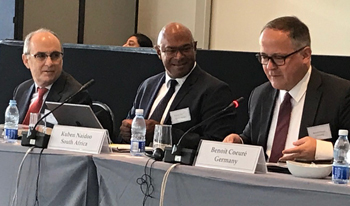14th BCBS-FSI high-level meeting on banking supervision for Africa
Cape Town, South Africa, 31 January and 1 February 2019
Ten years after the Great Financial Crisis (GFC), senior bank supervisors and central bankers in sub-Saharan Africa gathered to discuss the main changes since the GFC, technological developments impacting banking regulation and supervision, as well as technical innovation and financial inclusion.
A look back at the past and discussions to identify current and future challenges facing banking supervisors in Africa were the main features of the 14th high-level meeting on banking supervision, held on 31 January and 1 February in Cape Town, South Africa. The meeting was hosted by the South African Reserve Bank (SARB), and jointly organised by the Basel Committee on Banking Supervision (BCBS) and the Bank for International Settlements' Financial Stability Institute (FSI).

Before we get bogged down in very technical discussions around financial sector regulation and our regulatory priorities, it is important that we first remind ourselves of the policy imperatives behind the need to continuously strengthen the regulation and improve the resilience of our financial systems.
Governor Kganyago underlined the importance of the high-level meeting as an annual event bringing together representatives of the SARB, BCBS, FSI and sub-Saharan African central banks and supervisory authorities, and reminded participants of their responsibility to constantly work towards improving the resilience of our financial systems. The growing interconnectedness of financial markets has made international financial stability a global public good. Achieving long-term sustainable economic growth and developmental objectives requires a stable and well regulated financial sector.

After the GFC, we are all working on the elements of an Integrated Inflation Targeting monetary policy framework that combines monetary and macroprudential policies and in some cases interventions in forex markets to smooth volatility. This combination aims to strengthen policies and achieve both macroeconomic and financial stability.
As the global standard setter for payment, clearing and settlement activity, the Committee on Payments and Market Infrastructures, with its Chairman Benoît Cœuré, works to support financial stability by enhancing the risk management and supervision of financial market infrastructures. Mr Cœuré stressed fintech's potential for enhancing financial inclusion and the role that central banks and other authorities can play to help fulfil this potential. Over the past decade, significant progress has been made in expanding access to payment services, with a number of innovative solutions originating from Africa helping to increase access for underserved populations on that continent and around the world. But there is still much work to do, with a significant number of people still lacking the means to make fast, secure and trustworthy payments and to conduct other financial activities that would integrate them into the broader formal economy.

I would like to highlight an often overlooked objective for the Committee on Payments and Market Infrastructures and many of our members - enhancing financial inclusion. Expanding access to payment services is an integral part of our work and a key regulatory priority.
During the high-level meeting, banking supervisors from the region and beyond shared key lessons from their response to the GFC, and acknowledged common regulatory and supervisory challenges. The meeting wrapped up with a discussion on the developments of the financial supervisory architecture and how best to implement the important post-crisis regulatory reforms such as Basel III and, in this context, proportionality in banking regulation. The FSI presented findings of the recently conducted survey on the implementation of the Basel framework in 100 jurisdictions and discussed proportionality practices.

